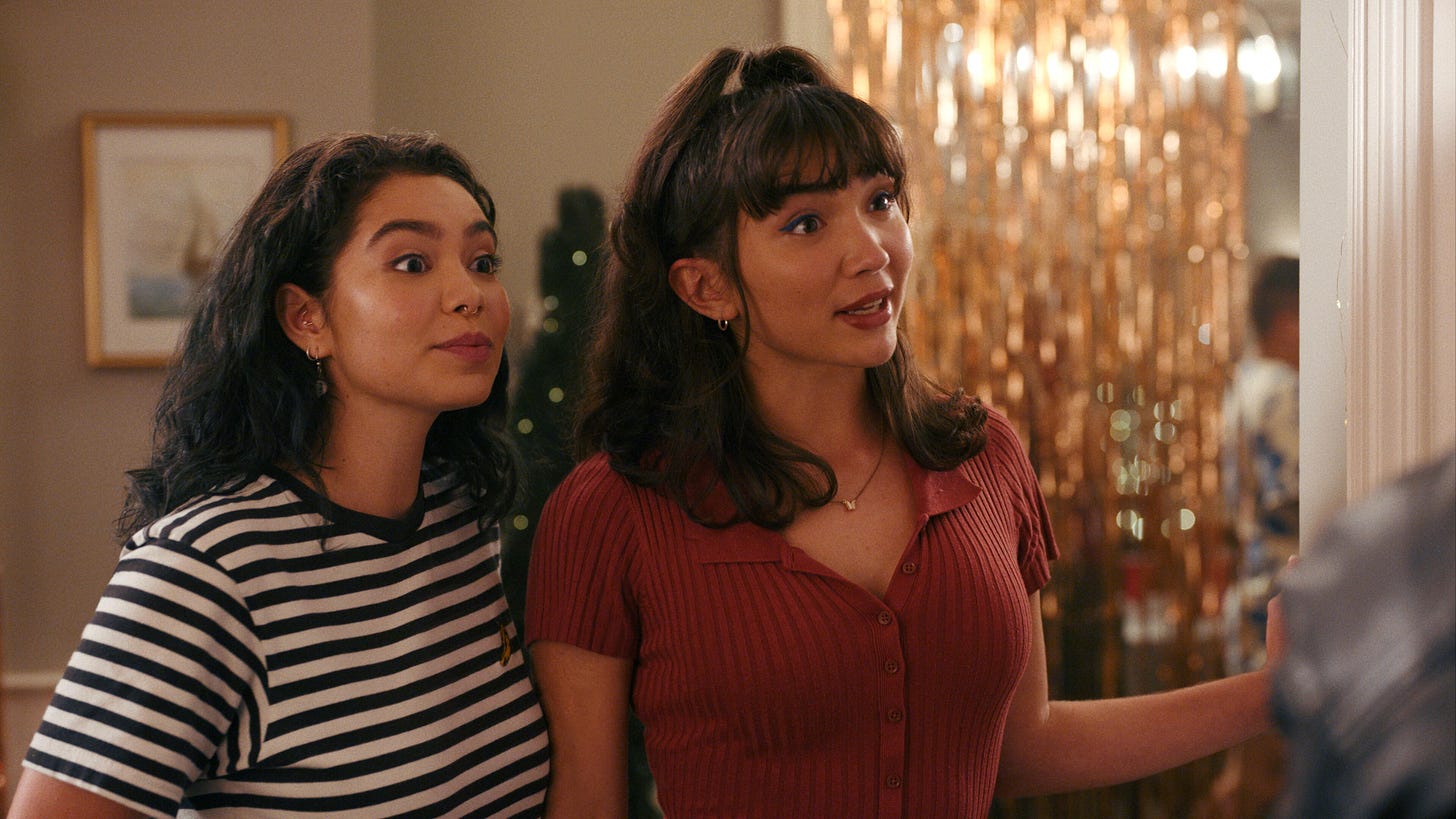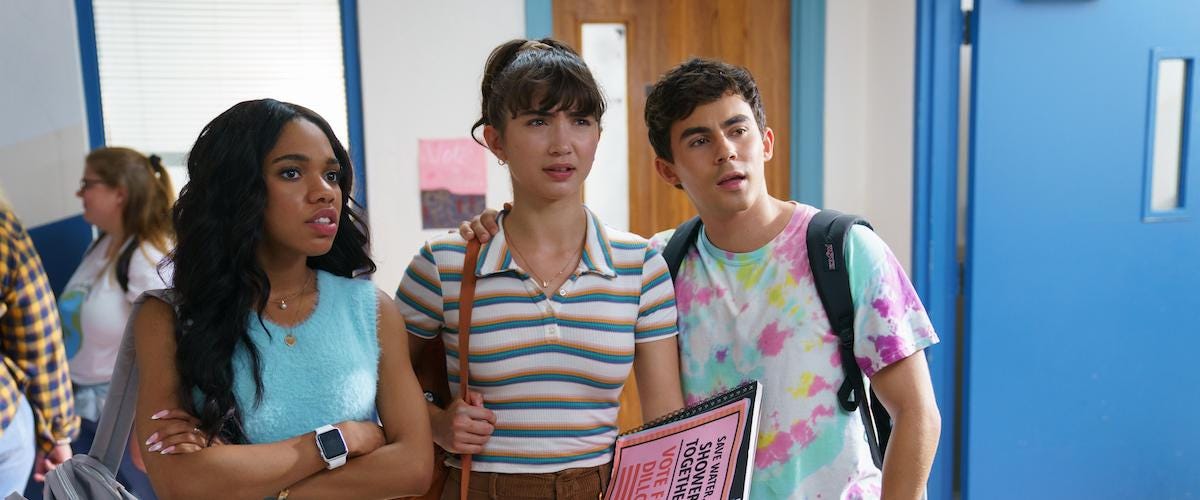In 'Crush,' The Familiarity Is The Point
The queer teen movie doesn't break new ground, but that's okay
This is the Sunday Edition of Paging Dr. Lesbian. If you like this type of thing, subscribe, and share it with your friends. A paid subscription gets you more writing from me and will help me keep this newsletter afloat. Consider going paid!
This week’s dispatch from the lesbian internet featured a lot of great stuff like finger jewelry, soccer herstory, and cowboy drag – upgrade your subscription so you don’t miss out.
It may sound familiar. A quirky high school girl who doesn’t quite know where she fits in, a long-standing crush who seems way out of her league, a case of mistaken identity, a flamboyant best friend. This list of tropes succinctly describes the new teen rom-com Crush, which just premiered on Hulu last week. The only difference between Crush and teen movies of years past is that most of the main characters in Crush are queer. Except, the plentiful amount of queer characters in the film isn’t really framed as a difference, as novel as it might seem.
Crush follows Paige (Rowan Blanchard), a high school student who loves art and is raised by her eccentric, overly-supportive single mother (Megan Mullally). Her best friend is Dillon (Tyler Alvarez), a theatrical young man who is running for class president against his equally high-achieving girlfriend, Stacey (Teala Dunn). For as long as she can remember, Paige has had a crush on Gabriela (Isabella Ferreira), one of the school’s many resident queer girls. After she’s accused of being an anonymous graffiti artist who’s been tagging the school, Paige is forced to join the track team, where she becomes closer to both Gabriela and her mysterious sister, AJ (Auli'i Cravalho). I won’t tell you the rest, but you might be able to guess what kind of shenanigans ensue.
Crush is not the first queer teen movie, but there’s very little precedent in this arena. Love, Simon broke ground as one of the first to come out of a mainstream studio, but it’s a coming-out story above all else. Writers Kirsten King and Casey Rackham were insistent that Crush not be about coming out at all. Homophobia does not exist in the universe they have created, and the queer characters seem to have all been out since they were twelve years old. (We see a flashback of Paige telling her mom she’s gay that lasts about three seconds.) While seeing Jennifer Garner respond so lovingly to Simon coming out was a healing moment for literally every queer person who saw the movie, that story has already been done before.
Olivia Wilde’s Booksmart is often held up as the shining example of what a great queer teen movie could be, but the humor in that film is quite raunchy, and more in the vein of an American Pie film than anything else. In some ways, Crush feels like a cross between the two films. It has the earnestness of Love, Simon, but the bombastic spirit and occasionally filthy humor of Booksmart. While the oscillation between these two spheres doesn’t always land perfectly, the ground it aims to cover is admirable, if not a little too audacious.
Quite consciously, the film seems to play out nearly every trope in the book. There is Paige’s mom, who is very clearly modeled after the “cool mom” archetype famously personified by Amy Poehler in Mean Girls. There are secret identities, secret admirers, a love triangle, impromptu bed-sharing, and a zany principal (played by an exasperated Michelle Buteau). There is even a colorful best friend, but in this case, the film pulls a fun trick on us. It’s easy to assume he’s gay when we first meet him – the gay best friend is a classic trope, after all – but he’s actually astonishingly heterosexual. (Dillon and his girlfriend, Stacy, are the only straight couple in the film, and they frequently gross out their peers.)
Significantly, Crush includes nearly every trope in the book except for the gay ones. There are no dramatic coming-outs, no unrequited yearning for straight characters, and, as one might expect from a rom-com, no tragedy. Rather than the queerness of the characters being a plot twist, it’s simply a natural part of the environment in which these teenagers exist. If it seems a little too optimistic, that’s kind of the point. Writer Kirstin King has said that their intention in making the film was to create a “utopic high school that we both wish we had.”
It’s a laudable goal, but one that can be tinged with sadness for some viewers. I recently saw someone talking about the experience of watching the Netflix series Heartstopper as being somewhat paradoxical. They felt happy that a series like that existed for all of the young people out there, but simultaneously devastated that nothing even remotely similar existed when they were a teenager. This is a reaction I know so many queer people have when we watch content that involves queer teens. It’s a sort of longing for a past that never existed.
All sappiness aside, Crush isn’t all that groundbreaking in the story it tells. It pans out just like any other teen rom-com, which can be a good thing or a bad thing, depending on how you look at it. But it’s hard to argue with the fact that the film clearly succeeds in doing what it set out to achieve.
King and Rackham have said that they modeled the film after their favorites in the genre, movies like 1999’s 10 Things I Hate About You. The Heath Ledger smash is another film that features a convoluted plot (sorry Shakespeare), but is utterly delightful thanks to its charismatic leads. While Crush doesn’t quite reach the level of 10 Things, its stars – namely Blanchard and Cravalho – are extremely charming and likable. Paige could have very easily been an insufferable ‘quirky girl’ character, but in Blanchard’s capable hands it’s nearly impossible to not be charmed by her perfectly calibrated eccentricities. It’s hard to define what exactly it means to have ‘star quality,’ but whatever it is, Blanchard’s certainly got it in spades. Cravalho, too, brings a lot of pathos to AJ, a character who keeps things close to the chest but is clearly brimming with unspoken feelings.
The moments where the film suffers are when it focuses too much on its occasionally insufferable side characters. I’m mainly thinking here of Aasif Mandvi’s track coach character, who is doing some sort of weird Antebellum accent that I just couldn’t overlook. (Mandvi is great in Evil, so I really don’t know what happened there.) Paige’s mom nearly veers into insufferable territory as well, but is saved from repetitive one-liner purgatory by Mullally’s considerable talents.
In many ways, what is most interesting about the film is how it functions as a cultural object. While it may not be the first queer teen movie, it is, as far as I’m aware, the first queer teen movie to be written by, directed by, and starring queer women. (The film was also produced by comedy legends Maya Rudolph and Natasha Lyonne.) To be sure, it’s not strictly necessary that queer stories be produced by or star queer people – that conversation is never productive – but it is uplifting to see the film’s stars discuss the movie in these terms. There’s something extremely refreshing about hearing Cravalho tell Decider that AJ is not much like her but is the type of girl she would go for, or reminiscing about how many of her friends she’s kissed.
Crush may not be reinventing the wheel, but it’s hard to resent something so earnest and good-hearted. And for now, maybe that’s enough.





